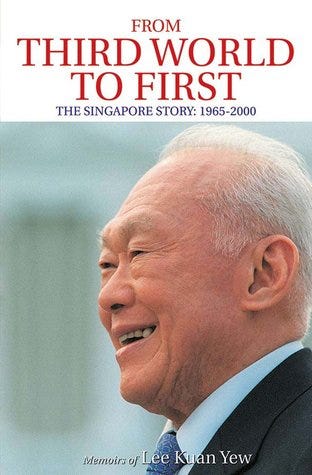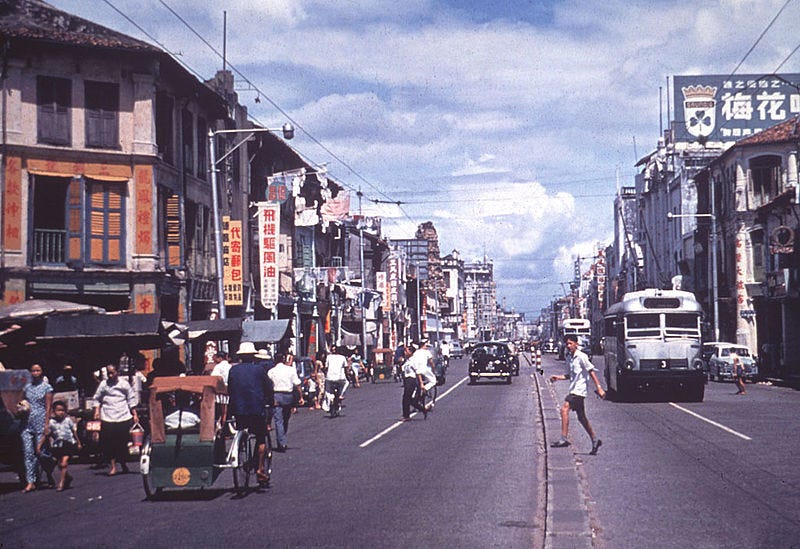A SHORT REVIEW OF THE BOOK, FROM THIRD WORLD TO FIRST: THE SINGAPORE STORY BY LEE KWAN YEW
A Review
As there is hardly a book or manual that teaches a pattern of catapulting a country from a third world to a first world, there exist however, wide ranging books that accounts the experiences of both good and bad leaders from different parts and times. they in turn may serve as a guide and inspiration for present or future leaderships. from third world to first: The Singapore story, is perhaps one of the most stirring books on development I have ever read. this is because of the position Singapore held as a third world country alongside numerous countries that were stricken by European colonialism, which makes it tranquil for any person from an underdeveloped country to relate with. Lee Kwan Yew articulates the story of how through his unpolluted intelligent leadership and innovative teamwork was able to transmute Singapore, a nation with no mineral resource, army, technology, skills and friends into a developed nation now competing head to head with the developed countries of Europe and America. In fact, the country was on natural grounds a failed state and would be unwise to think of it as a developing country.
Distinctively, one of the major thrust of his arguments for development is entrenched in human development, the people of Singapore needed to be educated and skilled in the basic knowledge civic, science and technology.to his demeanor it is a proven fact that transforming a nation from an underdeveloped to a developed nation includes transforming the ideological disposition and livelihood of a people. the people of Singapore were mandatorily educated in all ramification, especially in science and technology. Confucian teachings formed the bedrock of their moral standing as well as their loyalty to their family and the state. in an instance where there was deficit in knowledge on a particular field the government would sponsor the brightest student in that field to either Britain or America.in retrospect to the nations development, like many third world countries, Singapore was plagued with corruption and crime. lee and his cabinet were able to brilliantly identify a fitting way of inculcating a strong sense of trust in its multilingual and multiethnic population. this in turn grounded their continuous acceptance as a legitimate, accountable, trustworthy and efficient government. Lee was known to uncompromisingly uphold the rule of law which saw the punishment of corrupt leaders or persons in private and public space, and equally the perpetuation of a reward system for encouraging outstanding performance. appointments and employments were on purely meritocratic basis, where a nobody can become a somebody without knowing anybody. Singapore holds a distinguish ranking as one of the world’s uncorrupts nation in the world.
lee is Emphatic about any developing country, having the right preconditions before a consideration and adoption of a democracy in the frame and pattern of the United states, he holds that such precondition can be summed up as education, a large middle class, life must not be only about the bout for survival. I share in this belief that majority of the people must have acquired a certain level of education which will enable an informed and objective follower-ship, economic development and their major purpose of survival is not just for physiological needs such as food and shelter, only then can such a people contemplate adopting the American democratic style. Keeping in mind that the American democracy is over 200 years, and it became germane that a nation like Singapore, firstly tackle the imminent threat to its very existence. The people must have a planet size trust in the government of which in turn will show its commitment by providing them with the most basic needs for their survival. lee grasps that when the people of Singapore starting owning homes, the pattern of riots or demonstration changed from violent to civic arrays; this is because the people owned the shops, the business and homes and therefore the sort to protect them and not destroy in the process of making their grievances known. The adoption of the Britain parliamentary system of government by lee enjoyed legitimacy and the dividends of the “British democracy” was equally shared. is imperative however, to note that unlike the ideal British economic system of a welfare but it capitalistic economy, the Singaporeans made modification to suit their peculiarity, the Singapore economic system is pure meritocratic. this pattern created in the Singaporeans a strong sense of discipline and hard work as compared to some of their counterpart in Malaysia, Thailand, Indonesian and Vietnam.
The role of women is one of the most controversial political issue not just in the developed nations of the west but in Asia. I am astounded by the nascent and courageous manner in which lee handles such a sensitive matter. for instance, his key proposition on marriage during one of his campaigns, which later became the great marriage debate served as a substratum for women educational and economic empowerment. he holds that women who were educated were not marrying and this meant that these women whom were assets to Singapore would not be represented in the next generation. his argument was banked on the premise that intelligence is inheritable as proven later on by many western intellectuals in the field of psychology. As a Confucian, the Chinese traditions played a central in their social and by extension their economic development. However, he believes that not all tradition foster development. for instance, why do Asian men marry down (uneducated and underachieved) while the women marry up (educated and achieved)? This of course did not seat well with many Singaporeans and some members of parliament but it however served as a challenge for both men and women living in Singapore. however, his intentions were not o castigate the uneducated women of Singapore, but to encourage marriage of both male and female of equal qualification and education, as to there was no harm to the family but an improvement to quality of children in Singapore.

The articulate and emphatic manner in which Lee tells the story of how Singapore leapfrogged a hostile continent to sort help and attract investors into the island is highly commendable. especially being in the radar of other big, jealous and powerful neighbors. I think it was first the instinct for survival that pushed lee and his cabinet to grow at that pace to build an army and develop a sustainable economic system against all odd. investors stay in a country for very simple and obvious reasons, one of the most important is security. security in itself is nebulous however, lee was emphatic about dealing with all kinds of insecurity, internal as in corruption, ethnoreligious conflict and external as in military confrontation from other states within and outside Asia. until his resignation in 1991, the manner in which lee employed to pass the baton of leadership to the younger generation is unthinkably genius or for the most part haven’t been seen in any nation of the world. lee was able to hold on to the realistic point of view that that times are changing and for Singapore to continue in this trajectory of development, he needed to sell the idea of engaging and training successors to the parliament.in contrast to their African and Asian counterparts who hold on to power for the longest time and in some instance relinquish power to their family and close relatives, Singapore became an exception for its meritocratic employment and appointments.
Lee holds a track record of making good decisions, learning from past mistakes, mostly not from his, but of those who were ahead of him regardless of their ethnic and religious backgrounds. this however is not entirely true, because he holds strongly that social scientist had a “pet theory” on how governance should be and so learnt how not to listen to their advice and criticism. I disagree with him and I equally hold that social scientists are pertinent part of any society and their contribution to governance sets the pace for development and stability, they equally are part of the watchdogs of a country. I hope not to be accused of deprecation when I say that lee upholds an elitist ideology on suggestions whom he finds unmatched or unfitting to his perception of growth and development which must at all-time see fruition despite the opinion of social scientist.

I conclude by stating clearly that Lee Kwan Yew is perhaps one of the greatest political leaders the world has ever seen, which makes it difficult to criticize his methods of bringing policies to fruition as they most times work beyond expectation. it is a griping truth that his legacy will continue to outlive him as the father of modern day Singapore. his contribution to the development of other nation through advice, writing and oration shows the kind of man lee was. leadership is more than just ability. it is a combination of courage, determination, character and ability and all this makes people willing to follow a leader. Wholly this attributes are a brief description of Lee Kwan Yew as expressed in the Third World to First: The Singapore Story.



